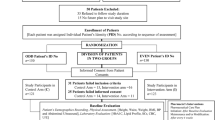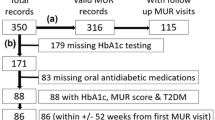Abstract
Objective To evaluate the effects of pharmacotherapy follow-up (PF) on metabolic control and clinical outcomes in type 2 diabetic patients. Setting Six community pharmacies (4 intervention and 2 control) in the Curitiba metropolitan region (Brazil). Main outcome measure Glycosylated Haemoglobin A1 (HbA1) and fasting capillary glycaemia. Methods We conducted a 12-month controlled trial involving a total of 161 patients in six community pharmacies between July 2004 and March 2006. Pharmacotherapy follow-up was applied only to patients in the intervention group. Results Of the 161 patients enrolled, 96 completed the study (50 intervention and 46 control). The administration of 574 consultations with the intervention group patients led to 119 negative clinical outcomes (2.3/patient [SD = 1.6]). The majority of detected problems were related to the ineffectiveness of pharmacotherapy (68.1%). Relative to the control group, the intervention group exhibited greater glycosylated haemoglobin (HbA1) reduction (−2.2% [95%CI −2.8%:−1.6%] vs. −0.3 [95% CI −0.8:0.2]; P < 0.001) and greater fasting capillary glycaemia reduction (−20.1 mg/dl [95% CI −31.9 mg/dl:−8.3 mg/dl] vs. 4.3 mg/dl [95% CI −13.4 mg/dl:22.2 mg/dl]; P = 0.022). These differences persisted after adjustment for baseline values. There were no significant differences in any other clinical measures between the groups. There were also no significant changes in the number of medications and treatment regimens between groups, with the exception of the percentage of patients undergoing lipid lowering treatment, which increased in the intervention group from 16% to 24% (P = 0.018). The initial medication regimen complexity index (MRCI) in the intervention group was 15.5 (SD = 7.8, range 4–40.5), and it decreased by 1.2 units (SD = 5.9) after 12 months (P = 0.149). Conclusions PF of type 2 diabetic patients in community pharmacies can improve the glycaemia control of patients through optimisation of medication profiles without significant changes in either the number of drugs used or the regimen complexity.
Similar content being viewed by others
References
Zimmet P, Alberti KG, Shaw J. Global and societal implications of the diabetes epidemic. Nature. 2001;414(6865):782–7.
Sociedade Brasileira de Diabetes. Tratamento e acompanhamento do diabetes mellitus. Diretrizes da Sociedade Brasileira de Diabetes. [Treatment and follow-up of diabetes mellitus. Guidelines of Brazilian Diabetes Society]. Rio de Janeiro: Diagraphic; 2007. 164 p. 85-89718-15-8.
Assuncao MC, Santos IS, Valle NC. Controle glicêmico em pacientes diabéticos atendidos em centros de atenção primária à saúde. [Blood glucose control in diabetes patients seen in primary health care centers]. Rev Saude Publica. 2005;39(2):183–90.
Gomes MB, Gianella D, Faria M, Tambascia M, Fonseca RM, Rea R, et al. Prevalence of Type 2 diabetic patients within the targets of care guidelines in daily clinical practice: a multi-center study in Brazil. Rev Diabet Stud. 2006;3(2):82–7.
Ivama AM, Noblat L, DeCastro MS, DeOliveira NVBV, Jaramillo NM, Rech N. Consenso Brasileiro de atenção farmacêutica. [Brazilian Consensus about Pharmaceutical Care]. Brasília: PAHO/WHO; 2002. 24 p. 85-87 943-12-X.
Fernandez-Llimos F, Faus MJ. From “drug-related problems” to “negative clinical outcomes”. Am J Health Syst Pharm. 2005;62(22):2348, 50.
de Castro MS, Fuchs FD, Santos MC, Maximiliano P, Gus M, Moreira LB, et al. Pharmaceutical care program for patients with uncontrolled hypertension. Report of a double-blind clinical trial with ambulatory blood pressure monitoring. Am J Hypertens. 2006;19(5):528–33.
de Souza WA, Yugar-Toledo JC, Bergsten-Mendes G, Sabha M, Moreno H Jr. Effect of pharmaceutical care on blood pressure control and health-related quality of life in patients with resistant hypertension. Am J Health Syst Pharm. 2007;64(18):1955–61.
Lyra Junior D, Amaral RT, Abriata JP, Pelá IR. Satisfaction as an outcome of a pharmaceutical care program for elderly in Ribeirão Preto–São Paulo (Brazil). Seguimiento Farmacoterapéutico. 2004;3(30):30–42.
de Castro MS, Correr CJ. Pharmaceutical care in community pharmacies: practice and research in Brazil. Ann Pharmacother. 2007;41(9):1486–93.
Fernández-Llimós F, Faus MJ, Gastelurrutia MA, Baena MI, Tuneu L, Martinez-Martinez F. Identificación sistemática de resultados clínicos negativos de la farmacoterapia. [Systematic identification of negative clinical outcomes from pharmacotherapy]. Seguimiento Farmacoterapéutico. 2004;2(3):195–205.
Aguas Y, Fernandez-Llimos F. Curso de iniciación al seguimiento farmacoterapéutico. [Initiation course on pharmacotherapy follow-up]. Badajoz: CIPF; 2009. p. 978-84-613-6255-4.
Sabater D, Fernández-Llimós F, Parras M, Faus MJ. Tipos de intervenciones farmacéuticas en seguimiento farmacoterapéutico. [Types of pharmacist intervention in pharmacotherapy follow-up]. Seguimiento Farmacoterapéutico. 2005;3(2).
Charlson ME, Pompei P, Ales KL, MacKenzie CR. A new method of classifying prognostic comorbidity in longitudinal studies: development and validation. J Chronic Dis. 1987;40(5):373–83.
Melchiors AC, Correr CJ, Fernandez-Llimos F. Translation and validation into Portuguese language of the medication regimen complexity index. Arq Bras Cardiol. 2007;89(4):210–8.
George J, Phun YT, Bailey MJ, Kong DC, Stewart K. Development and validation of the medication regimen complexity index. Ann Pharmacother. 2004;38(9):1369–76.
Sociedade Brasileira de Cardiologia, Sociedade Brasileira de Hipertensão, Sociedade Brasileira de Nefrologia. V Diretrizes Brasileiras de Hipertensão. [V Brazilian Guidelines of Hypertension]. São Paulo: SBC; 2006 [cited 2009 01 Sep]; Available from: http://publicacoes.cardiol.br/consenso/2006/VDiretriz-HA.pdf.
Sociedade Brasileira de Endocrinologia e Metabologia, Sociedade Brasileira de Nefrologia. Diabetes Mellitus: Tratamento da Hipertensão Arterial. [Diabetes Mellitus: Treatment of hypertension]. Rio de Janeiro: AMB-CFM; 2004 [cited 2010 20 oct]; Available from: http://www.projetodiretrizes.org.br/4_volume/12-tratament.pdf.
Sociedade Brasileira de Hipertensão, Sociedade Brasileira de Cardiologia, Sociedade Brasileira de Endocrinologia e Metabologia, Sociedade Brasileira de Diabetes, Associação Brasileira para estudos da Obesidade. I Diretriz Brasileira de diagnóstico e tratamento da síndrome metabólica. [I Brazilian Guideline of diagnose and treatment of metabolic syndrome]. São Paulo; 2005 [cited 2006 set 25]; Available from: http://publicacoes.cardiol.br/consenso/2005/sindromemetabolica.pdf.
Machado M, Bajcar J, Guzzo GC, Einarson TR. Sensitivity of patient outcomes to pharmacist interventions. Part I: systematic review and meta-analysis in diabetes management. Ann Pharmacother. 2007;41(10):1569–82.
Raji A, Gomes H, Beard JO, MacDonald P, Conlin PR. A randomized trial comparing intensive and passive education in patients with diabetes mellitus. Arch Intern Med. 2002;162(11):1301–4.
Jaber LA, Halapy H, Fernet M, Tummalapalli S, Diwakaran H. Evaluation of a pharmaceutical care model on diabetes management. Ann Pharmacother. 1996;30(3):238–43.
Cherchiglia ML, Machado EL, Szuster DA, Andrade EI, Assis Acurcio F, Caiaffa WT, et al. Epidemiological profile of patients on renal replacement therapy in Brazil, 2000–2004. Rev Saude Publica. 2010;44(4):639–49.
Choe HM, Mitrovich S, Dubay D, Hayward RA, Krein SL, Vijan S. Proactive case management of high-risk patients with type 2 diabetes mellitus by a clinical pharmacist: a randomized controlled trial. Am J Manag Care. 2005;11(4):253–60.
Mendes AB, Fittipaldi JA, Neves RC, Chacra AR, Moreira ED Jr. Prevalence and correlates of inadequate glycaemic control: results from a nationwide survey in 6,671 adults with diabetes in Brazil. Acta Diabetol. 2010;47(2):137–45.
Stratton IM, Adler AI, Neil HA, Matthews DR, Manley SE, Cull CA, et al. Association of glycaemia with macrovascular and microvascular complications of type 2 diabetes (UKPDS 35): prospective observational study. Bmj. 2000;321(7258):405–12.
Cranor CW, Bunting BA, Christensen DB. The Asheville Project: long-term clinical and economic outcomes of a community pharmacy diabetes care program. J Am Pharm Assoc (Wash). 2003;43(2):173–84.
Armour CL, Taylor SJ, Hourihan F, Smith C, Krass I. Implementation and evaluation of Australian pharmacists’ diabetes care services. J Am Pharm Assoc (2003). 2003;44(4):455–66.
Sarkadi A, Rosenqvist U. Experience-based group education in Type 2 diabetes: a randomised controlled trial. Patient Educ Couns. 2004;53(3):291–8.
Acknowledgments
The authors thank the pharmacists who contributed to this research: Marcelo Marcicano, Liege Bueno, Claudia Boscheco, Fernanda Ostrovsky, Paola Barrichello, Marcia Pinheiro, Renata Schulz, Julio Machado, Jr., Rodrigo de Paula e Souza, Paula Rossignol and students of courses of Pharmacy of Positivo University (Brazil) and Federal University of Parana (Brazil).
Funding
None.
Conflicts of interest
The authors have no conflict of interest with regard to this study.
Author information
Authors and Affiliations
Corresponding author
Rights and permissions
About this article
Cite this article
Correr, C.J., Melchiors, A.C., Fernandez-Llimos, F. et al. Effects of a pharmacotherapy follow-up in community pharmacies on type 2 diabetes patients in Brazil. Int J Clin Pharm 33, 273–280 (2011). https://doi.org/10.1007/s11096-011-9493-2
Received:
Accepted:
Published:
Issue Date:
DOI: https://doi.org/10.1007/s11096-011-9493-2




